Book Review

Meltdown:
The predictable distortion of
global warming by scientists, politicians, and the media
Cato Institute, 2004, 271 pages
Patrick J. Michaels

|
 t is often said that the strength of modern science is
its inherently self-correcting nature. In environmental science, this
self-correcting nature has finally taken hold, as climatologists struggle
to correct the misunderstandings and the hype about global warming that has
been sold to the public and politicians, and the ever-more grandiose claims
of some of their more excitable colleagues.
t is often said that the strength of modern science is
its inherently self-correcting nature. In environmental science, this
self-correcting nature has finally taken hold, as climatologists struggle
to correct the misunderstandings and the hype about global warming that has
been sold to the public and politicians, and the ever-more grandiose claims
of some of their more excitable colleagues.
The social dynamic of scientific journals, like that of the news media,
is structurally biased to favor dramatic stories about the impending end
of the world in a fiery inferno of global warming. But why are respected
journals like Nature and less-respected (but still more or less
popular) non-scientific magazines like Scientific American so
unskeptical about bad climate science? Michaels has a lucid and reasonable
explanation that will have any scientist nodding sadly in agreement.
Although global warming is a highly political issue, Michaels avoids
polemics and concentrates on presenting the scientific facts about
global warming in a style readily accessible to the layman.
Meltdown is a highly readable book that shows how the concept
of catastrophic global warming conflicts with the empirical evidence,
and why the general public has been kept out in the cold. There is so
much of this evidence that the book doesn't even mention two recent
discoveries that have effectively shattered the global warming myth.
The first of these was a recent article in Energy and Environment
concerning the famous "hockey stick" graph. This graph, which played
a prominent role in the IPCC reports, purported to show dramatic
temperature increases starting in the 20th century. The Energy and
Environment article demonstrated that the hockey stick graph was
wildly inaccurate and--worst of all--suggested that the authors of the
hockey stick knew this when they created it.
The second discovery was the finding that solar flux has been gradually
increasing over the past century. This finding casts into doubt the
attribution of any temperature increases to human factors. Despite the
best efforts of environmentalists and the news media to ignore these
findings, the general public is gradually starting to realize that the
ice under the global warming theory is very thin indeed.
Michaels points out that since the end of the 1930-1975 cooling period,
the surface temperature has begun to slightly increase, at the glacial
rate of 1-2°C per century. Contrary to what many people
believe, however, there is no consensus among climatologists as to
the cause of this increase. And as Michaels points out, the predictions
of mass extinctions, heat deaths, flooding, droughts, supertornadoes,
rampaging butterflies and malaria-carrying mosquitoes, and dramatic
temperature changes are mostly Hollywood-style hype. Some activists
have even predicted impossibilities like Siberia-like temperatures in
England and 120 degree heat indexes in the southeast United States.
The cold fact is that because 95% of the so-called greenhouse effect
is caused by water, any global warming will be largely confined to those
regions lacking atmospheric water vapor--that is, deserts and cold
areas like Siberia. And despite the gloom and doom predictions from
the media, and the sometimes laughably improbable predictions of
climate models and environmental activists, even these changes will
be way too small to melt the icecaps.
Using a writing style that is a little livelier than his first book,
Satanic Gases, Michaels systematically
debunks the inaccurate and biased reporting on climate from media
giants like the New York Times and Washington Post.
He points out that, despite the hype, the sea level around the island
of Tuvalu is falling, not rising. Greenland and Antarctica are not
melting, but actually getting colder. Penguins are not becoming endangered.
Nature has always had periods of warming and cooling, and penguins
have somehow managed to survive. Climatologists are starting to
realize that unless they can reach the public with the truth,
the only thing that will ultimately melt away is the respect of
the populace and with it, as the paradigm of "global warming"
is overthrown, their own funding.

December 22, 2004
Back


 t is often said that the strength of modern science is
its inherently self-correcting nature. In environmental science, this
self-correcting nature has finally taken hold, as climatologists struggle
to correct the misunderstandings and the hype about global warming that has
been sold to the public and politicians, and the ever-more grandiose claims
of some of their more excitable colleagues.
t is often said that the strength of modern science is
its inherently self-correcting nature. In environmental science, this
self-correcting nature has finally taken hold, as climatologists struggle
to correct the misunderstandings and the hype about global warming that has
been sold to the public and politicians, and the ever-more grandiose claims
of some of their more excitable colleagues.
